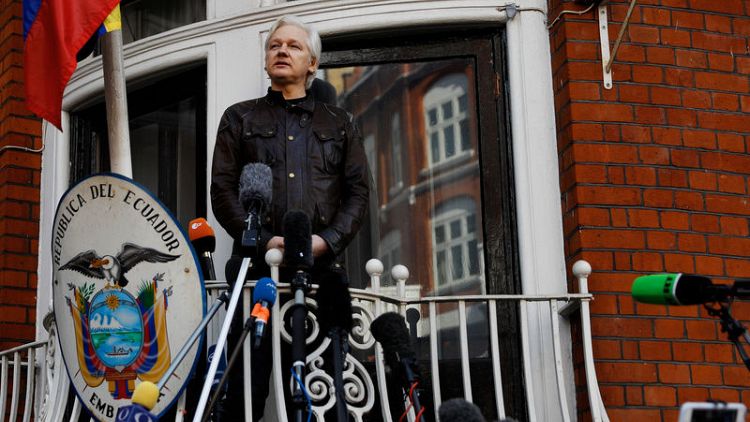LONDON (Reuters) - WikiLeaks on Sunday advised journalists not to report 140 different "false and defamatory" statements about its founder Julian Assange, who has been holed up in the Ecuadorean embassy in London since June 2012.
It was not immediately clear what prompted the advice to media organisations, but WikiLeaks singled out Britain's Guardian newspaper for publishing what it said was a false report about Assange. The Guardian did not immediately respond late on Sunday to a Reuters request for comment.
The Australian set up WikiLeaks as a channel for publishing confidential information from anonymous sources. He is a hero to some for exposing what supporters cast as government abuse of power and for championing free speech, but to others he is a rebel who has undermined the security of the United States.
WikiLeaks angered Washington by publishing hundreds of thousands of secret U.S. diplomatic cables that laid bare often highly critical U.S. appraisals of world leaders from Russian President Vladimir Putin to members of the Saudi royal family.
"There is a pervasive climate of inaccurate claims about WikiLeaks and Julian Assange, including purposeful fabrications planted in large and otherwise 'reputable' media outlets," Wikileaks said an email sent to media organisations and marked "Confidential legal communication. Not for publication."
"Consequently journalists and publishers have a clear responsibility to carefully fact-check from primary sources and to consult the following list to ensure they are not spreading, and have not spread, defamatory falsehoods about WikiLeaks or Julian Assange."
WikiLeaks did not respond to repeated requests for comment.
The 5,000-word email included 140 statements that WikiLeaks said were false and defamatory, such as the assertion that Assange had ever been an "agent or officer of any intelligence service".
WikiLeaks also said it was false and defamatory to suggest that Assange, 47, had ever been employed by the Russian government or that he is, or has ever been, close to the Russian state, the Kremlin or Putin.
Other items listed as false and defamatory included more personal claims including that Assange bleaches his hair, that he is a hacker, that he has ever neglected an animal or that he has poor personal hygiene.
Assange made international headlines in early 2010 when WikiLeaks published a classified U.S. military video showing a 2007 attack by Apache helicopters that killed a dozen people in Baghdad, including two Reuters news staff.
Later that year, the group released over 90,000 secret documents detailing the U.S.-led military campaign in Afghanistan, followed by almost 400,000 internal U.S. military reports detailing operations in Iraq.
More than 250,000 classified cables from U.S. embassies followed, then almost 3 million dating back to 1973.
(Reporting by Guy Faulconbridge; Editing by Kevin Liffey)
